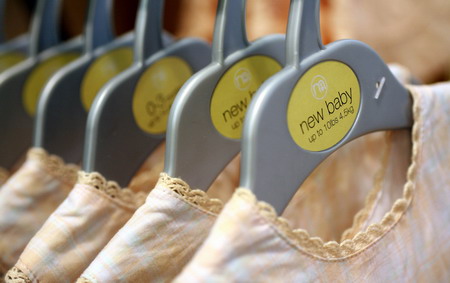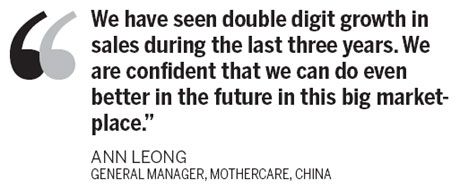Companies
Mothercare plans ambitious growth throughout China
By Tang Zhihao (China Daily)
Updated: 2011-02-21 10:53
 |
Large Medium Small |
|
 |
|
Baby clothes at a Mothercare store in Oxford Street, central London. The British company is eyeing China as a new and a fast-growing market for its global business. [Photo / Bloomberg] |
BEIJING - Mother- and baby-products retailer Mothercare UK Ltd plans to aggressively expand its business in China in an attempt to cash in on the country's vast baby population and growing purchasing power.
The company intends to set up 15 new outlets every year in China over the next few years. It is an ambitious target considering that Mothercare only arrived in China in 2008 with a store in Solana Lifestyle Shopping Park, Beijing. The company had 11 stores in China, mostly in the affluent areas of big cities such as Beijing, Shanghai and Hangzhou by the end of last year.
Ann Leong, general manager of Mothercare in China, said the company is also contemplating expansion in the second-tier cities of prosperous provinces. But that expansion will happen only after the company resolves logistics issues related to supplies, she said.
"We plan to have stores in second-tier cities this year. But logistics are an issue," said Leong.
The British company has set a target of having 26 stores in China by the end of this year.
To achieve this, Mothercare has tailored its business strategy to suit the local market. Unlike the United Kingdom, where most of its stores are in suburban areas, the Mothercare outlets in China are in urban centers and cater to mostly high-income customers.
As part of its growth plan, the company sources some of its products from China. However, the products are still priced higher than most local brands. Mothercare products are also about 20 percent more expensive than they are in the UK because of local taxes and distribution costs.
That to some extent explains the rationale behind the store locations in China. "The locations of the stores (in China) are an indication that our products are aimed at the more up-market consumers who are willing to spend more on clothing and other childcare items," said Leong.
In China, Mothercare operates through a joint venture with Goodbaby International Holdings International, based in Kunshan, East China's Jiangsu province.
It is one of China's largest producers of baby strollers with annual sales exceeding 2 billion yuan ($303 million). Leong said Mothercare will retain management control at all of its Chinese outlets.
The British company is not the only foreign babycare-product manufacturer to tap into the Chinese market.
"We have seen double digit growth in sales during the last three years," said Leong, without revealing any numbers. "We are confident that we can do even better in the future in this big marketplace."
The strong economic growth in China and higher disposable incomes have increased expenditure on newborns significantly over the past five years.
| ||||
The study showed that sales of childcare products in China increased to 165.3 billion yuan in 2009, up 123 percent from 2005. It predicted that sales of such goods will increase to 311 billion yuan by 2013.
Leong said shoppers on average spend around 300 yuan to 500 yuan on each purchase at her store, with more than 50 percent of them being repeat customers. The company's products are mainly targeted at middle class families with a monthly income of more than 7,000 yuan.
A report by Euromonitor pointed out that the middle class group in China will increase to 700 million by 2020 and account for 23 percent of the total population.
The implementation of family planning policy in China has made young parents, born during the 1980s, spend more on children's products.
Liu Yue, born in 1982, said the quality of the materials and design are the top considerations when it comes to buying clothing and toys for her three-month-old daughter. "Price is the last consideration when it comes to buying things for my daughter," she said.
"I prefer branded products because the quality and safety are guaranteed," said Liu. "I want the best for my daughter so that she can grow up in a healthy and comfortable environment."
Although the long-term prospects for the children's products market are good, the intense competition could cloud prospects for companies, said Leong.
"There are many domestic brands competing in the high-end market," she added. "What we can do now is to open more stores in China and focus on brand refurbishment."

| 分享按鈕 |



